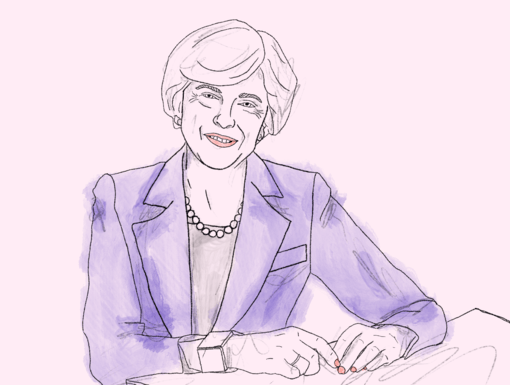
Drawing by Nathaniel St. Clair
Ziggy May is still prime minister, despite the fact that her Brexit deal has been thrice voted down by parliament, and despite her announcing that she would leave office once her deal was passed.
The Maybot is still PM because the bait offered by her quid pro quo was not enough to prevent a 3rd defeat. After this defeat, she said that a 4th vote on her deal will be decisive– if she loses again, she was going to call a general election. We can take her words here with a hefty pinch of salt. May has gone back on nearly everything she has said, sometimes more than once.
Throughout this fiasco, which has been going on for nearly 3 years after the Brexit referendum, May has displayed a remarkable combination of stubbornness, stupidity, ineptitude, and supreme ability to believe her own fantasies, to the point where some suspect she has an altar devoted to the worship of unicorns in the PM’s official residence.
Last week and today the House has been holding a series of “indicative votes”, that is, non-binding votes which set-out options reflecting various alternative positions on Brexit available to parliament. Every one of these options has been defeated.
Anyone with a basic knowledge of game theory can see why was likely to happen.
Suppose, hypothetically, there are 3 options/candidates on offer:
#1 (preferred overall on the basis of preliminary soundings)
#2 (my own preference)
#3 (the preference of those who would on no account opt for #2 or #3)
So what do I do, preferring #2, but knowing that those opting for #1 and #3 won’t vote for my preferred #2?
If I have a really strong objection to #1, I’ll abandon #2, and vote for #3, with the aim of keeping out #1.
This is exactly what happened. Ukania is now in the untenable position of leaving the EU without a deal in 11 days’ time and yet MPs have voted to rule out a no-deal Brexit.
May’s deal has of course been voted down several times, and now Labour’s preference for a Common Market 2.0 has also been voted down.
Common Market 2.0 would involve reverting to the relationship the UK had with the European Economic Community in the 1970s and 80s, that is, avoiding closer political union or having to accept the jurisdiction of the European Court of Justice.
Hardline Brexiters are dead-set against Common Market 2.0 because it would involve freedom of movement, making continued contributions to the EU Budget, and following EU regulations while remaining outside the EU bodies creating these regulations.
The really divisive issues remain the need for a second referendum, the call for a general election, and an extension to the article 50 withdrawal process.
The options on the table in the “indicative votes” failed because the MPs in question made their support for this or that option contingent on it being tied to a second referendum (24 Labour MPs oppose this), or a general election (most Tory MPs oppose this because opinion polls are trending in Labour’s direction), or the need for a longer extension to the article 50 withdrawal process (hardline Brexiters oppose this because they fear an extension might give more time for opponents to foil Brexit). Many MPs support two of these “contingencies”, some MPs support all three.
In line with my game-theory example, the above led inexorably to a scenario where an MP voting on a specific issue may seemingly have outfoxed his or her opponents, but alas also themselves as well.
Hence some Brexiters even sought a fudge represented by a “managed no-deal Brexit”, seemingly unaware that the EU has shut the door repeatedly on this piece of waffle. As the former tennis star John McEnroe used to say when berating umpires: “You cannot be serious!”.
One suggestion for a way forward is for the proponents of the two most supported options—Common Market 2.0and the Norway model—to negotiate a common position that can then command more support from Remainers and Half-Remainers than May’s deal (which rejects the single market and customs union) or a no-deal Brexit.
(Norway, with Lichtenstein and Iceland, is a member of the European Economic Area (EEA) and the European Free Trade Association (EFTA), giving it full access to the EU single market, and placing only limited restrictions to trade with the EU. In return, along the lines of Common Market 2.0, Norway makes significant contributions to the EU contributions to the EU Budget, and follows EU regulations while remaining outside the EU bodies making these regulations.)
The hardline Brexiters suspect that any option appealing to Remainers and Half-Remainers will be watered-down in a war of attrition so that the UK is in essence still a member of the EU, even if all of this is done under the trappings of a “Brexit”.
Another problem remains. Now that she has announced she will quit if her deal is passed, few opposition MPs want to vote for anything that leads to a hardline Brexiter becoming her successor. This is especially important for the staunchly pro-Remain and pro-second referendum Scottish National Party (SNP), which has 35 MPs.
For now it remains to be seen whether May will find a way to bring her deal to a 4th vote (with Speaker Bercow casting a beady eye on how this is done), and if she will call a general election if she loses yet again, as will almost certainly be the case.